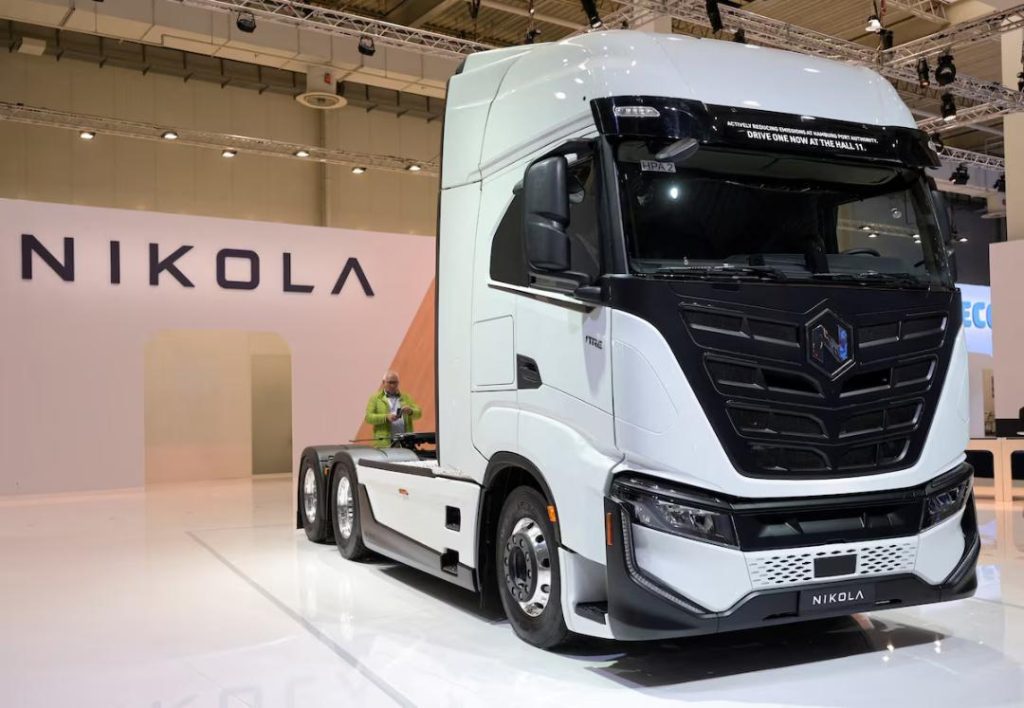
Tesla’s Rival EV Maker Nikola Goes Bankrupt
In a shocking turn of events, Nikola, the American electric truck maker once touted as a rival to Elon Musk’s Tesla, has filed for Chapter 11 bankruptcy protection. The company has announced that it will pursue a sale of its assets, marking a significant setback for the electric vehicle (EV) industry.
Nikola’s CEO, Steve Girsky, attributed the company’s financial struggles to various market and macroeconomic factors, which have hindered its ability to operate. The news comes as a surprise to many, considering Nikola’s impressive growth and public listing in 2020.
Founded over a decade ago, Nikola had been gaining momentum in the EV sector, touting its innovative electric trucks and hydrogen fuel cell technology. The company had secured significant investments and partnerships, including a deal with General Motors to produce its electric pickup truck. However, it seems that Nikola’s rapid growth and ambitious plans ultimately led to its downfall.
The bankruptcy filing is a stark reminder of the challenges faced by startups in the EV industry. Despite the growing demand for electric vehicles, many companies have struggled to scale and achieve profitability. Nikola’s failure highlights the importance of sustainable business models, robust financial planning, and adaptability in the face of changing market conditions.
So, what went wrong?
Nikola’s struggles can be traced back to its aggressive growth strategy, which led to significant cash burn and financial strain. The company had invested heavily in research and development, manufacturing facilities, and marketing campaigns, which put a strain on its finances. Additionally, Nikola faced stiff competition from established players like Tesla, Rivian, and Ford, which have significant resources and brand recognition.
Another factor contributing to Nikola’s downfall was its lack of a clear path to profitability. The company had focused primarily on developing its electric truck product line, but it lacked a clear strategy for generating revenue and achieving profitability. This made it difficult for investors and partners to justify continued support for the company.
The bankruptcy filing is a significant blow to Nikola’s employees, investors, and partners. The company’s Chapter 11 bankruptcy protection will allow it to restructure its debt, sell off its assets, and potentially emerge from bankruptcy with a new business model or ownership structure.
What does this mean for the EV industry?
Nikola’s bankruptcy serves as a wake-up call for the EV industry, highlighting the importance of sustainable business models and financial discipline. While many companies are focused on developing innovative products and technologies, they must also prioritize financial planning and profitability.
Tesla, in particular, will likely benefit from Nikola’s struggles. As the leading EV manufacturer, Tesla has a strong brand, significant resources, and a clear path to profitability. The company’s dominance in the EV market is unlikely to be challenged by Nikola’s bankruptcy, and it will likely continue to drive innovation and growth in the sector.
Rivian, another EV startup, may also benefit from Nikola’s struggles. Rivian has been gaining momentum in the EV market, with its R1T electric pickup truck and R1S electric SUV generating significant interest. The company’s partnership with Amazon and its focus on sustainable manufacturing practices have helped it establish a strong reputation in the industry.
In conclusion, Nikola’s bankruptcy is a significant setback for the EV industry, highlighting the challenges faced by startups and the importance of financial discipline. While Tesla and other established players will likely continue to drive innovation and growth in the sector, Nikola’s struggles serve as a reminder of the importance of sustainable business models and profitability.
Source:






